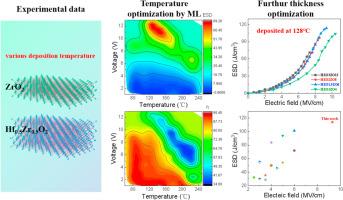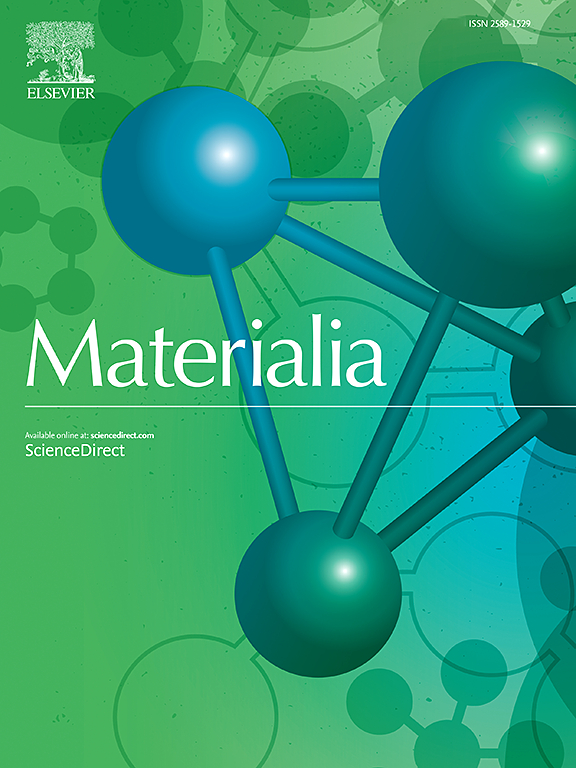通过调节沉积温度和薄膜厚度,优化了HZO3ZO12薄膜的储能性能
IF 2.9
Q2 MATERIALS SCIENCE, MULTIDISCIPLINARY
引用次数: 0
摘要
介质电容器由于其超高的功率密度和超快的充放电能力,在能量存储应用中,特别是在脉冲电源系统中是至关重要的。其中,HfO₂基薄膜在微能量存储器件中尤其有前景。在这项工作中,双层Hf 0 .₅Zr 0。₅O₂(3nm)/ZrO₂(12nm) (HZO3ZO12)薄膜在宽温度范围(80-225℃)下沉积,以系统地研究其储能性能。采用机器学习辅助的多目标优化方法确定最佳沉积温度,发现128°C是最大限度提高储能性能的理想条件。在此沉积温度基础上进一步优化厚度以提高性能,在9.1 MV/cm的外加电场下实现了113 J/cm³的优异储能密度。该研究展示了一种将机器学习与实验设计相结合的强大策略,以优化介电电容器,为开发高性能储能材料提供了路线图。本文章由计算机程序翻译,如有差异,请以英文原文为准。

Optimized energy storage performance in HZO3ZO12 thin films through modulation of deposition temperature and film thickness
Dielectric capacitors are critical for energy storage applications, especially in pulsed power systems, owing to their ultrahigh power density and ultrafast charge/discharge capabilities. Among them, HfO₂-based thin films are particularly promising for micro-energy storage devices. In this work, double-layered Hf₀.₅Zr₀.₅O₂(3 nm)/ZrO₂(12 nm) (HZO3ZO12) films are deposited across a wide temperature range (80–225 °C) to systematically investigate their energy storage performance. A machine learning-assisted multi-objective optimization approach is employed to identify the optimal deposition temperature, revealing 128 °C as the ideal condition for maximizing energy storage properties. Further thickness optimization based on this deposition temperature is used to enhance the performance, achieving an excellent energy storage density of 113 J/cm³ at an applied electric field of 9.1 MV/cm. This study demonstrates a powerful strategy combining machine learning with experimental design to optimize dielectric capacitors, providing a roadmap for developing high-performance energy storage materials.
求助全文
通过发布文献求助,成功后即可免费获取论文全文。
去求助
来源期刊

Materialia
MATERIALS SCIENCE, MULTIDISCIPLINARY-
CiteScore
6.40
自引率
2.90%
发文量
345
审稿时长
36 days
期刊介绍:
Materialia is a multidisciplinary journal of materials science and engineering that publishes original peer-reviewed research articles. Articles in Materialia advance the understanding of the relationship between processing, structure, property, and function of materials.
Materialia publishes full-length research articles, review articles, and letters (short communications). In addition to receiving direct submissions, Materialia also accepts transfers from Acta Materialia, Inc. partner journals. Materialia offers authors the choice to publish on an open access model (with author fee), or on a subscription model (with no author fee).
 求助内容:
求助内容: 应助结果提醒方式:
应助结果提醒方式:


